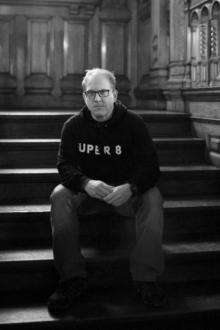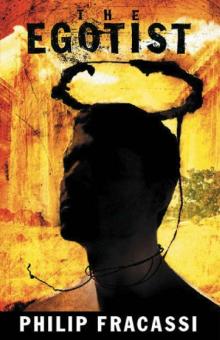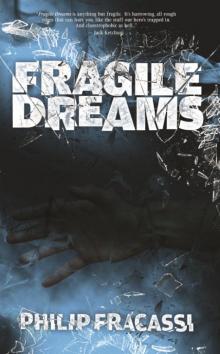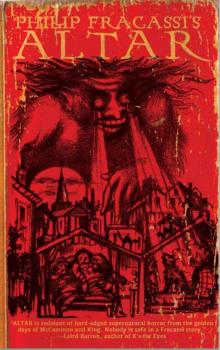- Home
- Philip Fracassi
The Egotist Page 12
The Egotist Read online
Page 12
Yes, the grocery business has been good to me. And now that it’s over, there isn’t a whole lot left to do.
We close that night, and I hug each and every employee that closes with me. I feel extremely hypocritical, but what the hell - I want to do something nice for them.
The doors are locked up for the last time and I stand there, out front, as they all walk or drive away. Standing in the night, looking at the glass doors, the lights now dark behind them, I can make out glimpses of the shiny floors, see the silhouettes of the product stack-displays that I assisted in making. Yes, my handiwork abounds within, and although it is a place where I have grown, it is also a place I have helped grow.
It being late, and the street being clear, and all my employee friends being gone forever, I find myself desperate for closure. I walk once around the block and end up right back in front, looking at the darkened aisles. I light a cigarette from a pack I lifted from a carton I lifted, and pace back and forth in front of the market.
I pace and I pace, letting time pass me by for about fifteen or twenty minutes. I walk toward the side of the store, where I know there are some scattered brick stacks from a wall they took down in our sad little parking lot. Putting my cigarette out in one, and picking up another, I make my way back to the front of the store.
I stand and look at the place, staring at the giant glass wall which bears the emblem and name of the establishment, and I can’t help but feel just a little ambushed by the whole experience.
Two years! Two years I have given to this store! What was I thinking? I have been sucked in by the Agenda, the payment plan, what I call the Giant Cheese Dispenser. Like every other mouse, I stand in line to get my little piece of cheese so I can order cable with the movie channels, drive a car, listen to a CD, read a book. It is a dark, dark place within a dark, dark world.
Hefting the brick, feeling its grainy texture brushing lightly against the tips of my fingers, its weight substantial against my palm, I let it fly.
I leap backward into the street as huge slabs of glass crash onto the sidewalk, making more noise than I ever thought possible. I bring my arms up to protect my face as glass spills around me, the unearthly crash echoing into the night like a shattered dimension.
I don’t feel good, and I don’t feel right. But I feel much better, and that’s something. Slowly, and in deep thought, I walk away down the dark sidewalk as silent alarms blink furiously blocks away. I do not wish to hide, but to be seen. I am not of this place anymore, I have no ties to it. I am now part of a different plateau, a new world.
As I light another pilfered cigarette I know that nothing on the planet with the Giant Cheese Dispenser will ever touch me again.
BOOK TEN
SURRENDER
Black
I don’t think I really know how to approach this. I’m not sure I have any good ideas . . .
This thing. This loss. The ideas that come to me are so weak, so puny, so insignificant. Death is like that, it can burrow through your mind like a black worm, sucking your thoughts clean, tearing at your emotional paneling, wearing your energy down to nothing.
My father’s death was very much that way. Knowing of it was very much that way. It’s like they say . . . a crushing blow. It’s hard, they say. Be strong, they say. But there is no strength, no well to draw from, no back-up battery. I’m drained. I have lost my super-human powers and am now simply a mortal.
When the phone rang I was in the bathroom, and I would not have answered it except I thought it might be Marie canceling on me again and I didn’t want to give her the satisfaction of leaving another message on my answering machine.
It wasn’t Marie, however, it was somebody else. Someone I didn’t even know. A lawyer. Was this W. Buhner, did I live at such-and-such address, was I the son of such-and-such? I answered all his questions - why? I don’t know. When I confirmed who I was, he told me my father had passed away, and when could I come in and see him at his office - there were some things to go over. Remnants.
I didn’t know how to react. My father and I hadn’t spoken in a very long time . . . years. When I was stabbed and put in the hospital he came to see me, but I didn’t speak with him then. When he tried to approach me, I remember calling him a vulture and telling him and my punk sister to get out of my room. He left the next day, I was told. I suppose I shouldn’t have been so mean, but emotions come out in strange ways when the only time you see someone in five years is when you’re hanging upside down in a hospital room drooling all over yourself . . . but I won’t go into all that.
So I took about an hour to gather myself. I cried for a bit, which I suppose is good. It helped me get over any shock I may have been feeling. I showered, changed into some of my best clothes, which weren’t all that nice, and drove myself over to the lawyer’s office that very day.
I didn’t even know my father had an attorney, and it was weird driving out there to see him. He was about a two hour drive from my place, which put him about two hours from my father’s place in the other direction. Right in the middle. I pondered the oddness of this, and wondered briefly why my father had chosen an attorney so far away from his own home. If it was for an occasion such as the one I was currently experiencing, I thought it a rather dumb reason. Whether I drove two hours or four hours wasn’t really relevant when my father was dead, but maybe he thought I would think differently. Maybe he thought I wouldn’t make the long drive. Maybe I wouldn’t . . . who knows?
When I finally met the lawyer, a fellow named Tim Dugan, it was late afternoon going on evening and I was hungry. Dugan must have been in situations like this before, because when I entered his office he had a whole spread going on. It was like a buffet in there. An entire table filled with fruit and croissants, little cakes, coffee, sodas.
“Before we get started, why don’t you eat something, have some coffee or something,” he said, pointing to the table. Instead of waiting for an awkward denial, which he probably got from a lot of self-conscious people, he just headed over there himself and started digging in: pouring himself coffee, munching a buttered croissant, really going for it.
My stomach growled and I only pondered for another second before I joined him, filling a tiny white paper plate with all sorts of stuff. I sat down on a big, brown leather couch and began munching away.
“You take anything in your coffee?” he asked me, holding a steaming cup.
“Uh, no. Black is fine.”
“Good, you’re going to need this, we’ve got a lot to talk about.” He set the coffee down next to me on a little shiny brown table, then went over to his desk and began sorting through some paperwork. He then called his secretary, told her to send all his calls to “the machine” and go home for the night.
I looked out his window, a view overlooking this small city, and noticed dusk settling in. I figured we had better get started with whatever it was we were doing. I moved off the couch and set my plate on the little brown table. I poured myself some more coffee and sat down in a chair in front of his desk. He looked at me and smiled, studying me a little.
“Do you need to use the restroom or anything? I know it was a long drive for you,” he asked, and I could tell that once he got started, it was going to be a long go.
I told him no, and he just nodded and went right into it.
My father had saved up a lot of money, he told me. He had done a lot of investing, and he had a pretty serious life insurance policy. Since he had died of natural causes, the policy was totally valid.
I listened to all this, and although he never threw out actual dollar figures, I could sense an odd lump growing in my chest. It was as if my feelings were twisted up in combat, my pain and sorrow at my father’s loss mixing it up with some sort of weird anticipation . . . an excitement. A red flag went up inside my head, however, it all seemed too good. I felt that something was being forgotten . . . overlooked. When I realized what it was, my heart sank.
“Hold on,” I said, “what does she g
et?”
He looked at me with a little blank stare. “Who?” he started, and then just smiled and shook his head with realization. “Are you asking about your sister or your mother?”
“Whatever.”
“Well, W., they’re not really relevant. Let me explain . . .”
I breathed a sigh of relief as he went on to say that I was listed on every form as the sole beneficiary for my father’s estate. The house wasn’t worth much, he told me, only about a couple hundred thousand. I gulped at that, and wondered exactly how much of that couple hundred thousand I was going to receive. I tried to keep my excitement down, tried desperately. But there was no fooling it, I was going to be rich.
I sat quietly and listened as Tim Dugan told me the figures on the rest. The mutual funds, the insurance policy, the land, the assets . . . all of these words melted away into pure numbers, dollar signs and dollar figures. It was all there in black and white. My father had left me a fortune, the man to whom my last words had been used calling him a vulture had worked his entire life in order to build, amass, and acquire . . . for me. He was dead, I was alive and rich. He had died working towards a pension and a retirement, and I would never have to work at all. With the money the lawyer was talking about I could live respectfully for twenty years and never have to lift a finger!
It was stupefying and energizing at the same time. I was packed with heat.
While I was there Tim Dugan told me that my father’s funeral had already been taken care of, and that the costs were taken care of as part of “the arrangement.” He told me where to be, and when to be there. I shook Tim Dugan’s hand at the end of it, walked out to my car and drove the two hours home.
Driving home I obeyed the laws of the road and kept my music turned down. I didn’t want to do anything to mess up my inheritance.
I stand outside at the funeral, feeling the loss as if for the first time. It’s windy and gray, the minister is saying something, and I am thinking about nothing. I am so suffocated by emotions I can hardly breathe. The inheritance is not on my mind now, this moment is not about me. I can only think about him, and the things we experienced together.
I look up and see, standing across the grave, the two women who drove him to his death. My sister wears black, which is nothing new for her these days. My mother, whom I have seen only once before and have never spoken to, is standing beside her. She means nothing to me, she is little more than a stranger standing there. She isn’t crying, and I am glad. I can’t stand hypocrisy, and the boredom on her aging face is as much a comfort to me as any words she might speak.
I turn to the minister, stare at him for a bit and watch his mouth move. I turn away and look at my sister and see an expression on her face that is so disturbing, so irregular, so out-of-place, that it literally sends a chill through me.
She is looking off to my right, and I swear that she is wearing the smuggest expression of lust I have ever seen. It disgusts me. My father, our father, lies six feet below us, the coffin not even covered in dirt, and here she stands goggling her worn wears at some mourning stranger. I’m appalled, my brain is stupefied. Not caring what she thinks, I turn my head in the direction of her ogling stare to find the receiver of such incredible disgrace . . . and find myself ruined. Completely, and utterly, ruined.
My friends stand to the right of me. Lemus stands in a new black suit that must have cost him about twenty pages, but his expression is aimed at the ground, and he gives no heed to those surrounding him. I’m quite sure he’s embarrassed to be here at all, but he came out of respect for me and I am grateful for that. Next to him is John Liggins, and although John Liggins’ face tells of sorrow, his eyes tell a different story altogether.
His eyes tell me a story of lust, of secrecy, and of deception. His pupils are pin-point arrows of indecency and trickery, and they are focused on the flirtatious strumpet across a mound of dirt and a heap of gray flesh. Although nearly imperceptible, I can see a small twist at the end of his lips, an upward hairline curl of glee that gives him away completely. I continue to stare at him, and my black hate and mingled terror must sway him some, because he sends his eyes to me, and seeing me, to the ground at his feet. Although I see no more of his smile, his game has been revealed, and the horrid truth has been released.
I turn back to my sister, and she also looks at me. Not with shame, or a coy cover-up of chagrin, but with pure and unadulterated triumph. Her eyes are on fire, and I can see that her fingers are clenched into fists. As the minister says something about dust and flings holy water upon the corpse of our father, my sister and I silently declare battle.
I know the only outcome of this war will be Pain, but there is no other course. Once our father is buried deep down in the sodden dirt of our future battleground, I will find a way to destroy her.
Bring It On
I feel like I’ve spent the last two years of my life wrapping up twenty years of mispreparation. So many happenings, so many relationships. When I look back on them I am, admittedly, overwhelmed by it. The girls – my girls – that have come and gone are now just wicked memories. Although I still consider myself to be fairly young, I know that I am at the end of that laboriously taxing phase of my life which includes relaxed relationships and loose romances.
I am at the point now where I must surrender a part of my life, a way of living. Not by force, mind you, not by any trick card of the system that binds, but by my own hand, my own ethics. There comes a time when you can no longer make-believe, no longer imagine certain things or carry lofty ideals, no longer wish and wait rather than wish and work. I am of an age of disruption, where mind and body counsel to decide upon a certain path, leaving some things behind and allowing other things to come to the front. Such is the lifestyle of the gigolo for me, the loose cannon, the bachelor, the swinger, the go-to guy, sweet sugar, Casanova.
All gone.
The lust is replaced with other things: the understanding of loss, the intimate knowledge of surrender. I know that my ego is a brash and bawdy thing, but it has been whipped, beaten by the storms which encompass it. Though it tries to shelter itself in my brain, it is sitting on a throne surrounded by corruption, lies, and deceit. There are plots against it, dark thrusts of treachery which will disrupt its sweet path with their own, secretive agenda.
Now I sit in the dark with a picture of Marie, my white trash lover, my betrayer, who has meant so little to me but consumed so much of my essence. I wonder about such things. I ponder the effort I have had to make each day to wake up and decide to keep her, to embrace her, to listen to her boring, trying thoughts. It has been an unmanly, machine-like effort, horribly uniform with the will of society I have spent so much of my life rebelling against.
To love is not to love at all, but to force out resisting elements and replace them with the microchip of formed will which is not inserted at birth but inserted in the schools, on the television and media. It’s not like I’m beating her - no bruises! So if I seem to be getting upset now it’s because I feel so accused!
I have tried my best. I have conformed to the will of the land and made this woman a part of my life. I have given in to the temptations of flesh and burrowed myself into a dark place so that when I am with her I can be somewhere else in my mind, somewhere quiet and safe. I cannot be bothered with the daily routine of upkeep these relationships seek to hold dear, but I have made the effort! Do you see her limping? Do you see her crying? Do you see her calling 911, screaming of poison in her drink? NO! Then why leave it? Why leave me?
I am only human.
I am also rich, like all good people, and have made efforts to surround myself and those involved with me in creature comforts of stereo and home and cable. Yet she leaves me here, alone, in a mental state that is frail from recent events, such as my father’s death and my best friend’s betrayal with my cursed sister.
My only friend? A dime-novel writer. A man who writes about homosexual rape. This is my confidant, my lieutenant. It is with him tha
t I will begin my course of revenge on all of these elements that have betrayed me, starting with her.
Like the grocery store that consumed years of my life, so has she consumed my youth, my wariness, my innocence. What is the cost of punishment for that? Death? No. Is it ridicule, embarrassment, misfortune, abrasion, violence? Do I light her on fire? Do I hire a criminal to slash her? What is the answer for such a repelling crime as to steal the youth of a willful boy? To replace his ego with loss?
To steal her mind would be the thing. To do to her what she has done to me. A bit of a lobotomy on both ends would be the trick - an eye for an eye and all that. It’s sinister. I don’t remember ever feeling quite so sinister. Rambunctious, yes. Sporadic, yes. Destructive even, yes. But never quite so evil-thoughted as I am now. I know now that during my time in the hospital things were closing around me. I was changing. Somewhere, deep within my cut body, I knew I would become this. Now, like all great villains, I am a scarred and haggard thing. And now my physical being finally mirrors the corruption which is inside of me and, because of it, I am allowed a certain freedom. A certain movement of will has cleared a way. Some space up there in the cranium has been . . . freed up.
So . . . her mind it shall be. And how it will be done is simple. I will do nothing. I will do nothing. I will do nothing. Repeat it, like a chant.
She will call - nothing. She will come and knock on the door - nothing. She will attempt to communicate with me through my friends - nothing. In time, her mind will be replaced by something quite different. Something very much like confused sadness, concern, or abasement. And when that time has come, her calls will come packaged within a different tone, and she will use a different voice with me. The knocks will be harder, then softer. Her persistence will ebb and flow like the tides, and I will be the great bulbous moon affecting them.

 Behold the Void
Behold the Void Sacculina
Sacculina The Egotist
The Egotist Fragile Dreams
Fragile Dreams Altar
Altar